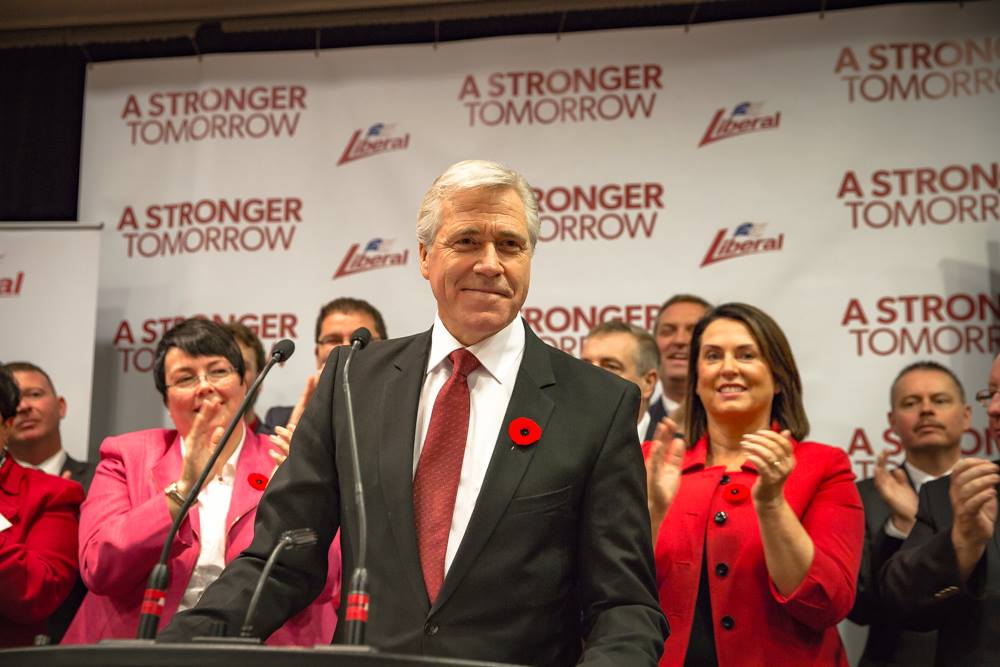Canada News
Liberals calling for change win majority in Newfoundland and Labrador election

Dwight Ball, Leader of the Liberal Party of Newfoundland
(Photo from Facebook)
CORNER BROOK, N.L.—The Liberals earned a hefty majority win in Monday’s provincial election in Newfoundland and Labrador, ending 12 years of Progressive Conservative rule after a low-key campaign that tapped into voters’ desire for change.
Buoyed by Liberal victories in every one of Atlantic Canada’s 32 federal ridings on Oct. 19, provincial Liberal Leader Dwight Ball repeatedly invoked Justin Trudeau’s winning strategy, saying, “People of our province want politics of hope, of change.”
Once Ball assumes power, every province east of Manitoba will be governed by Liberals, and there won’t be any governments—federal or provincial—using the Conservative brand.
The premier-designate was introspective when asked about his party’s win Monday, citing his late father as a sure source of inspiration in the days ahead.
“He would say, ‘Dwight, stay grounded and if you can do anything to contribute … to people who are less fortunate, people who struggle in life, will you do that?’” Ball told reporters gathered at his campaign headquarters inside a Corner Brook hotel.
“That’s the kind of work ethic you can expect from me in the next four years.”
The Liberals won 31 of the legislature’s 40 seats, the Tories seven and the NDP two.
Ball, a 58-year-old former pharmacist and entrepreneur, has said he plans to forge close links with Trudeau’s Liberals, ending an era dominated by confrontation between the province and Ottawa.
During the 25-day provincial election campaign, Ball never wavered from a safe, front-runner strategy that included a politically popular pledge to kill a Tory plan to increase government revenue by raising the harmonized sales tax from 13 to 15 per cent on Jan. 1.
Elected as Tory leader only 13 months ago, Premier Paul Davis told voters the election was about leadership and warned about what he called a Liberal hidden agenda that included massive cuts to government spending and public service jobs to deal with a projected $1-billion deficit.
Davis, a 54-year-old former police officer, won his riding of Topsail-Paradise.
Speaking to party supporters in the St. John’s area, Davis said he plans to help rebuild his party in the years ahead.
“I commit to you tonight that the Progressive Conservative party of Newfoundland and Labrador will be ready in 2019,” he said. “We will be ready to fight another day… I will lead our steps to rebuild our great party.”
NDP Leader Earle McCurdy, a 65-year-old former union leader who won the party’s leadership race last year, failed to win a seat.
During the campaign, he took aim at the Liberal promise to find $400 million in savings, saying the only way they can achieve that is by cutting government jobs, which Ball has denied.
The New Democrats held on to two seats in St. John’s. They had three when the campaign started.
“None of us chose to be part of this party because it represented an easy way to get power,” McCurdy told supporters in his St. John’s district. “We chose to answer the call because we believe in a more equal and fair and… just society.”
The Conservative party’s popularity seemed unassailable during Danny Williams’ tenure as premier between 2003 and 2010, when a growing offshore energy sector helped increase government spending from $5 billion to $7 billion.
Under Kathy Dunderdale, Tory popularity tanked. She stepped down in January 2014.
Her departure was followed by an aborted leadership race and a sustained slide in world oil prices that crippled the province’s finances. In 2013, about one third of provincial revenue came from the energy sector, but that figure has since dropped to about 20 per cent, leading to much larger projected deficits.
Erin Crandall, a politics professor at Acadia University in Wolfville, N.S., says even though there will be Liberal governments in every province east of Manitoba, she said it would be a mistake to draw conclusions about Liberal popularity across the country.
“I think it’s a bit more nuanced than that,” Crandall said in an interview, adding that voters decide provincial elections based on regional issues that don’t always align with federal issues.
As for federal-provincial relations, that often have more to do with personalities that party labels, she said.
“You can look at Danny Williams and Stephen Harper who had terrible relationships but were both representing Conservative parties,” she said.





















